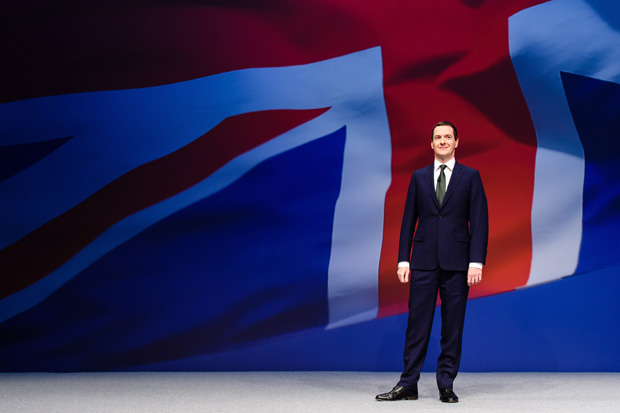Rather more attention was paid last week to the strange position of George Osborne’s feet than to the dark shape lurking behind him. My own theory about his stance on the conference platform is that he was imagining himself as a operatic tenor, belting out an aria in praise the magic elixir he has administered to the formerly consumptive heroine, the UK economy, and pitching to be her next prince. But operas, like political careers, tend to end badly: so why the rumbling bass notes from the orchestra pit, and what is that sinister thing in the shadows?
I’m not talking about Corbyn and McDonnell fighting in a sack with their own colleagues: they’re a comic subplot. What I’m referring to in this overstretched metaphor is a chorus of gloom about the global economy, emanating most recently from the IMF meeting in Peru. We all know about the slowdown in China, and its effect on economies from which it buys raw materials. We’re less familiar with the perils of a huge build-up of debt in emerging markets, of which Bank of England governor Mark Carney, among others, warned in Lima.
Companies and state agencies in developing countries have taken advantage of low interest rates to pile on ‘over-borrowings’ estimated by the IMF at $3.3 trillion. Much of that is actually denominated in US dollars, which have been strengthening against a trade-weighted index of other currencies for the past 15 months, making the debt harder to service and repay. When domestic conditions oblige the US Fed to raise dollar interest rates, most likely early next year, a global shock could follow — and central bankers who feel quantitative easing has already passed safe limits are afraid that there will be no remedies left in the monetary medicine chest.
‘Currently, being a pessimist has seldom been easier,’ says the FT. Not for me, with my habitually cheery views of the UK economy, which really has responded to Osborne’s elixir as well as finding its own willpower to recover. But even I realise that high in the lighting rig above the Chancellor’s head in Manchester was a writhing python of doom. I’ll keep an eye on it for you.
New hot-shot
Speaking of operas, plotlines often repeat themselves in the soap variety — and that’s how it looks at Barclays, which has picked another hotshot American investment banker as chief executive. This time the chosen candidate for the post vacated in 2012 by Bob Diamond is James ‘Jes’ Staley, formerly of JP Morgan, the blue-chip US corporate bank that Barclays has been striving to emulate for the past 30 years. Reportedly Staley was favoured in 2012, but looked too expensive and too American at the time — so the job went to not-so-hotshot Antony Jenkins, who never looked right and was shown the door by incoming chairman John McFarlane in July.
Let’s hope Staley’s appointment doesn’t signal a third attempt by Barclays to build a global investment bank: I was there for the first one, and saw from the inside how it multiplied risk without delivering shareholder value. More promisingly, McFarlane has spoken recently of the logic of merging several European-owned investment banks to create one champion fit to compete against Wall Street: that would be a better task to set Staley.
Meanwhile, McFarlane has also kept the plot moving by fingering as his own potential successor Sir Gerry Grimstone, the Standard Life chairman and former Whitehall mandarin who has been approached to become Barclays’ deputy chairman. They would make a formidable boardroom duo, neither being inclined to mince words.I once sat opposite Grimstone at a dinner in London for grand Indian guests; the intended topic of flattering conversation was the rise of India as a new economic power. ‘Give us your thoughts, Gerry,’ said the host. ‘Shouldn’t we be talking about China?’ replied Grimstone to an embarrassed silence. ‘That’s where the real story is.’
Yellowish fizz
Watchers of the global brewing industry — not to mention City bankers connected to the deal — are in a fever over the £68 billion agreed acquisition of London-listed SAB Miller (which has huge businesses in Africa and owns brands such as Fosters and Grolsch) by Anheuser-Busch InBev, the Belgian-based market leader with Budweiser, Beck’s and Stella Artois already in its portfolio. That certainly creates a beer monster, with around 30 per cent of the world market.Whoopee for the shareholders, who include a crew of Brazilian and Colombian billionaires: I hope it serves them well. But the real story to raise a glass to for British consumers is the survival — against a half-century trend of industry consolidation that has swallowed so many famous names, and of which this takeover is surely the zenith — of smaller breweries, and new ‘micro’ breweries, that actually make flavoursome ales rather than the indistinguishable yellowish fizz of the Miller-Busch-InBev behemoth.
At the Pearly Gates
How unkind of fate to send Geoffrey Howe to the Pearly Gates just behind Denis Healey, who was so horrid to him in the House of Commons. But if they have to pass the time of day while St Peter is busy interviewing Jackie Collins, Howe might care to remind his former nemesis that another free-market change-maker will be waiting to re-engage the Labour bruiser in debate. The late Sir John Cowperthwaite, financial secretary of Hong Kong in the late 1960s, was perhaps the only British-born political figure ever to have carried low-tax, laissez-faire principles into every corner of government — and he took no truck at all from Healey, who as Labour’s defence secretary repeatedly begged him in vain to contribute more towards the British military presence in the colony. As Healey himself recalled. ‘I always retired hurt from my encounters with the redoubtable financial secretary.







Comments